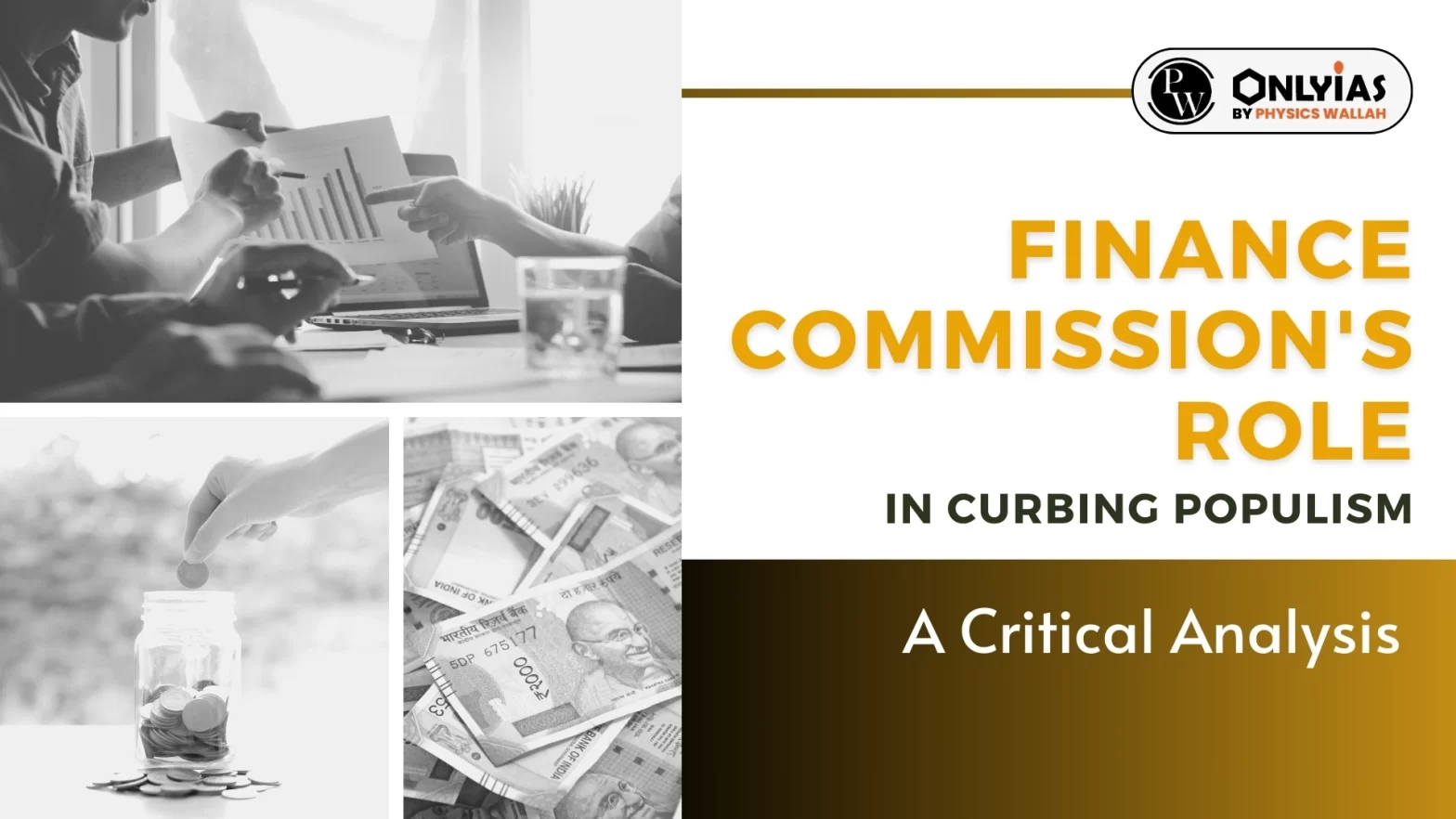Context: This editorial is based on the news “Finance panel should curb populism” which was published in the Business Standard. The 16th Finance Commission (FC) is about to be constituted for recommending the devolution of Central taxes and grants to States and the recent RBI’s published report- “State Finances: A study of Budgets” has red-flagged few issues.
The Finance Commission: Article 280
- Article 280 of the Indian Constitution: Finance Commission is a constitutional body that is established by the President of India.
- Article 280 (3) of the Indian Constitution: Under this article, apart from recommending the devolution of taxes and grants-in-aid to the States, the FC may be asked by the Centre to look into any other issue “in the interest of sound finance”.
- FCs provide Grants to States: For bridging any post-devolution revenue deficit the States may face, which acts as a disincentive for States to undertake fiscal reforms.
- FC’s Response on Incentives: It was only to lay down the principle that adequate incentives should be given to States based on outcomes, and the outcome-based indicators should be fixed against each incentive using credible and verifiable data.
Challenges Faced by the 16th Finance Commission: Rising Debt and Freebies
-
- The Finance commission provided some sector-specific incentives on health, education, agriculture, etc., and the issue is about the deteriorating finances and rising debt of States, especially post-Covid.
- The 16th Finance commission will certainly be asked to look into, like States reverting to the Old Pension Scheme (OPS), and unsustainable subsidies flowing from the guarantees or freebies promised at the time of elections, regardless of the financial conditions of States.
-
- The Finance commission may not be equipped or even mandated to deal with the freebies.
- However, it can play a positive role in highlighting the strains in finances that freebies create, often forcing States to borrow beyond their capacity and passing on the burden to future taxpayers, affecting future growth.
-
On Criteria of Transfers:
-
- Finance commission transfers are generally based on the triple criteria of equity, equalization and efficiency. But fiscal efficiency has been treated as dispensable by the FCs.
- The 15th FC gave only 2.5% weightage to the fiscal efficiency as measured by tax effort (own Tax to GSDP ratio).
Finance Commission’s Role in Curbing Populism
- Widely Used: Both States and the Centre indulge in populisms to serve their respective political ends. Besides, the two may also differ on what constitutes populism.
- High Expense & Debt: Many States have deficits because of subsidies for populist measures.
- An assessment of the FY2022 Finance Accounts of all States show that States spent 0.87% of their GSDPs on the average on subsides, but a few States spent much more (Punjab 2.35%, Rajasthan 1.92%, Chhattisgarh 1.62%, Bihar and Jharkhand 1.58%, etc.).
- Also, the argument that backward States need more funds to improve delivery of services falls flat in view of these data.
- Impact on Seventh Schedule of the Indian Constitution: It also may amount to Centre’s intrusion into States’ legislative powers.
- Difficult for Categorization: The categorisation of schemes into populist and non-populist cannot be done objectively, as development requirements differ from State to State.
- No Appropriate Actions Taken: Institutions, like the Finance Commission, Supreme Court or the Election Commission before whom the matter came up, could also not do much.
- On Pension Scheme: States are reversing from the New Pension Scheme (NPS) to the Old Pension Scheme (OPS) introduced in 2004 and West Bengal and Tamil Nadu have never even implemented the NPS, whereby this liability was limited to the serving life of the employees.
- As per RBI study, this liability to be 4.5 times more in case of OPS compared to the NPS, with the additional burden reaching 0.9% of GDP by 2060.
The Path Ahead
- Need for Consensus: A better mechanism to control such expenditure would be through consensus between the Centre and the States rather than through FC devolution.
- Performance-based Incentives: The 15th Finance commission proposed measurable performance-based incentives for States in “incurring expenditure on populist measures”.
Conclusion
Populism of a particular State cannot be financed by taxpayers of other States. If populism is the choice of a State, it must be at its own cost and risk. The RBI report rightly argued for the Finance commission to consider a higher share of conditional transfers to States “based on reforms, quality of expenditure and fiscal sustainability.”
| Prelims Question (2023)
Consider the following:
1. Demographic performance
2. Forest and ecology
3. Governance reforms
4. Stable government
5. Tax and fiscal efforts
For the horizontal tax devolution, the Fifteenth Finance Commission used how many of the above as criteria other than population area and income distance?
(a) Only two
(b) Only three
(c) Only four
(d) All five
Ans: (b) |
![]() 4 Jan 2024
4 Jan 2024

